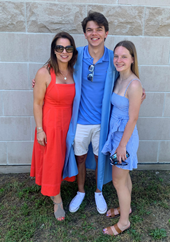A Personal Story: Attorney Deb Hedges Shares How Her Estate Plan Gave Her Peace of Mind After Losing Her Husband
After losing her young husband to a 5 year battle with cancer, Attorney Deb Hedges thought that she would never practice estate planning law again. It just hit too close to home. Losing a spouse at 42 was life changing, not just personally but professionally.
As years passed, Deb began to realize that her personal story could help others through this difficult time. She shares, “I know first-hand how important estate planning for young families is and I have witnessed the peace of mind that comes with having a plan in place when you face an unknown future. Having our affairs in order allowed me to focus on my family and heal after he passed away. I empathize with my clients who are facing a similar loss and I have practical advice that will help to ease the stress and burden of the estate administration process. I realize that although you never think tragedy will happen to your family, it is very important to be prepared.”
Thankfully, with her estate planning background, Deb and Derek were prepared. Derek had a life insurance policy in place when he was diagnosed. This was important especially having young children, who were 4 and 7 at the time. They had an estate plan with a fully funded revocable trust, where Deb was the Trustee. Derek’s estate avoided probate, an important goal for any plan. With Deb’s background, she understood the importance of having a solid estate plan in place and this provided some much needed comfort during an uncertain time.
Deb appreciates that she and Derek were able to have important although difficult discussions and make decisions together about their children’s future. She learned what his wishes were regarding guardianship, college planning, and parenting. Deb says, “although we had many difficult conversations that young couples never expect to need, it was comforting to have Derek’s input before he passed.”
The importance of setting up an estate plan early was reinforced within a month of Derek’s passing. Sadly, Deb’s close friend lost her husband to a sudden heart attack. This friend unfortunately had no time to prepare and encountered many obstacles with their financial affairs which added to the confusion and stress she faced alone. Life is unpredictable and we have no control or guarantees. We can only do the best we can to prepare and then appreciate the time we have with our loved ones.
Even though Deb and Derek had 5 years, there were still things she learned through this difficult journey:
- Have a Power of Attorney (POA) and Health Care Proxy in place. Derek’s name was on everything, so having the POA was necessary to get things in order. Sometimes she needed a specific form from a financial institution, but their own POA form was useful in dealing with utilities, insurance and bank accounts. The Health Care Proxy was essential during Derek’s incapacity and addressing issues related to Hospice care, pain management and treatment options.
- Document your assets and accounts. Deb didn’t have anything like an Asset Trust Organizer™ to identify their assets and accounts. She admits that with a tool like the ATO, she would have avoided some headaches later on. For example, online banking was set up using Derek’s name and login. Even though the account was jointly owned, when she filed the death certificate, the bank canceled his online account. Deb couldn’t login to access their auto-pay accounts or account numbers. The ATO would have documented this information. Typically one person pays the bills, so documentation is paramount.
- Expect extra levels of complexity and delays even when you’re fully prepared. Refinancing Deb’s house was a challenge. Half ownership was in his trust, so she had to make a distribution to herself before refinancing. It was doable, but there were extra steps to take so the process took longer than anticipated.
- Trusts are not one and done financial instruments; they need to change over time. Deb’s kids were young when she and Derek selected a standard trust where the kids would get everything at age 30. Now that her children are a bit older, 30 doesn’t look that far away! She has since updated her trust to include an Inheritance trust and has added a corporate trustee. As kids mature, they change, and their needs change. Trusts should accommodate this natural progression.
 Deb’s experience has been formative. It’s a hard road for anyone to navigate. We appreciate Deb sharing her personal story, so we can learn how setting up an estate plan early played an important role in easing the burden in the midst of this life altering loss.
Deb’s experience has been formative. It’s a hard road for anyone to navigate. We appreciate Deb sharing her personal story, so we can learn how setting up an estate plan early played an important role in easing the burden in the midst of this life altering loss.
Learn more about Deb in her bio on our team page.





